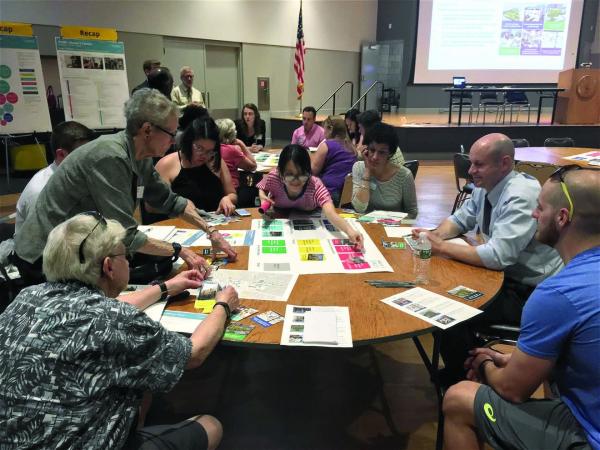December 13, 2017

After a PLAN: Glover’s Corner planning meeting became the site of a community protest, the Reporter asked activists and the city to respond. This op-ed was submitted by the Dorchester Not For Sale group. To read the Boston Planning and Development Agency’s submission, follow this link.
By Cindy Tao, Jeannie Do, Michelle Nguyen, and Avi Nguyen
Displacement is ripping Dorchester apart, but the crisis could bring us together. We are young people who have lived here all our lives. After decades of isolation, we’ve seen Dorchester’s many ethnic communities start to build a new, more united community.
Now, though, we are seeing gentrification pushing out our neighbors who can’t afford the skyrocketing rents and home prices that are only getting worse. Displacement and unaffordable housing are hurting all of us in our lives and in our hearts.
New development in Glover’s Corner could mean thousands of affordable housing units for working class families who want to live in Dorchester. New zoning guidelines could protect the affordable housing we have now and keep families here. But if the city’s planning process favors luxury and “market rate” housing, we are going to lose Boston’s biggest working class neighborhood.
Many generations of immigrants have worked hard to build the vibrant Dorchester we have today. If the Boston Planning and Development Agency green-lights a high-rent Glover’s Corner, a wave of displacement will wash through Dorchester. It will traumatize communities — Vietnamese, Black, Cape Verdean, Irish — that have experienced displacement over and over. We don’t want to go through that trauma again. And that motivates us to work for community stability.
For the Glover’s Corner process to turn out right, the people who will be affected most — renters, people of color, low-moderate income whites, non-English proficient speaking immigrants — need to be at the center of the discussion. That is not happening yet, for several reasons.
One is that the BPDA does not seem to be able to reach them. The agency’s workshops are overwhelmingly white with some Vietnamese, and a few Black and Cape Verdean residents. Renters also appear to be far below the 87 percent level of residents in the Glover’s Corner study area. And language used during the meetings is inaccessible to many everyday people.
Other reasons: the meeting place is inaccessible by public transit; the BPDA does not provide childcare for working families; and it does not provide food for meetings that run from 5:30 to 8 p.m.
And another: The BPDA’s meetings privilege BPDA voices over those of residents. A typical meeting starts with an hour-long lecture from city staff, moves to a small group exercise that BPDA staff design and run, and ends with a very short report-back. Residents do not have an open forum where we can discuss the most important issues about transportation, housing, jobs, and the way those issues affect each other. We do not get to define possible solutions.
Many of us have tried to participate in these meetings. But we can’t bring our family members and neighbors to a process that they won’t trust. So instead, we have been working with a group called Dorchester Not For Sale that is asking hundreds of residents what solutions will work for them.
Early this fall, Dorchester Not For Sale met with BPDA planners, asked for detailed data on the study area, and for time to digest the information. We got absolutely no response — not a letter, email, or a phone call — even though we sent a follow-up letter asking a second time.
Two weeks ago, our group brought more than 60 residents to a BPDA workshop on transportation. When the meeting followed the usual script for 40 minutes, we stood up and said: We want to be part of this process, but our voices are not being heard.
Then we walked out, taking two-thirds of the people in the room with us, almost all the people of color, and as far as we can tell, most of the renters, the people who are going to be most affected by whatever this process decides.
This can’t continue.
We want the Glover’s Corner planning process to turn out right. We want development — development that does not displace us, but improves Dorchester for all of us. We are willing to work with the BPDA. We think what they are doing has value. But the input they are getting is not coming from all of Dorchester.
If you put together the BPDA’s planning resources and our community mobilizing capacity, PLAN: Glovers Corner can succeed. We want to make that happen. For it to happen, the BPDA will actually have to talk with us, and it will have to relax its iron grip on the process.
Cindy Tao, Jeannie Do, Michelle Nguyen, and Avi Nguyen are Dorchester residents and organizers with the Asian American Resource Workshop’s Dorchester Organizing & Training Initiative.


